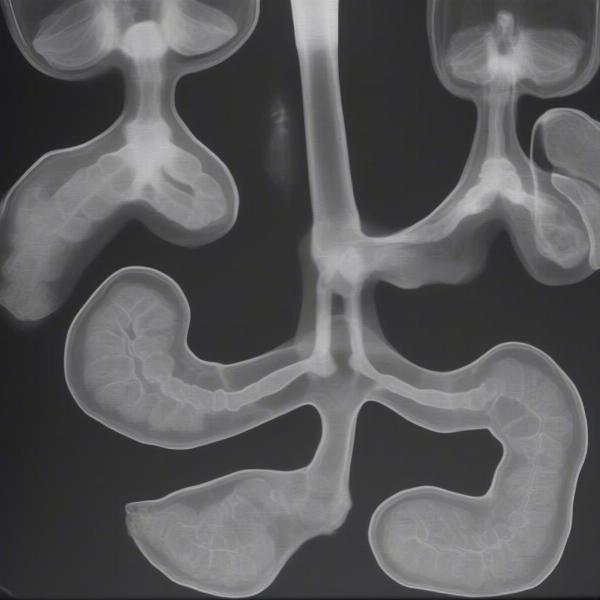A dog barium study, also known as an upper gastrointestinal (GI) series, is a specialized X-ray procedure used to evaluate the esophagus, stomach, and small intestines of your canine companion. This diagnostic tool can help veterinarians identify a range of issues, from swallowing difficulties to foreign objects and tumors. It involves administering barium sulfate, a chalky, radiopaque substance, which coats the lining of the GI tract, allowing for clear visualization on X-rays. Understanding this procedure can help you feel more prepared and less anxious if your vet recommends a barium study for your dog.
What is a Dog Barium Study?
A barium study in dogs is a valuable diagnostic tool that allows veterinarians to visualize the upper gastrointestinal tract. It’s a relatively safe and non-invasive procedure that provides crucial information for diagnosing various digestive issues. During the study, your dog will be given barium sulfate, a contrast agent that shows up white on X-rays. This contrast helps highlight any abnormalities in the esophagus, stomach, and small intestines.
 Dog Barium Study X-ray
Dog Barium Study X-ray
Why Might My Dog Need a Barium Study?
Several symptoms might lead your veterinarian to recommend a barium study for your dog. These include chronic vomiting, regurgitation, difficulty swallowing, weight loss, abdominal pain, and suspected foreign body ingestion. If your dog exhibits any of these symptoms, a barium study can help pinpoint the underlying cause. For example, if your dog swallowed a toy, the barium study can reveal its location and size.
How is a Dog Barium Study Performed?
The procedure usually begins with fasting. Your veterinarian will likely instruct you to withhold food from your dog for 12-24 hours before the study. Water may be allowed up to a few hours before. The barium is then administered orally, either mixed with food or given via a syringe. Multiple X-rays are taken over several hours as the barium moves through the GI tract. This allows the veterinarian to observe the movement and identify any obstructions, strictures, or other abnormalities.
What are the Risks of a Dog Barium Study?
Barium studies are generally considered safe, but as with any medical procedure, there are potential risks. These are rare and typically mild, including constipation (which can usually be managed with increased water intake and a mild laxative), aspiration pneumonia (if the barium enters the lungs), and allergic reactions to the barium (though this is exceedingly uncommon). Your veterinarian will discuss these risks with you before the procedure.
What Happens After the Barium Study?
After the study, your dog may be given a mild laxative to help eliminate the barium from the GI tract. You might notice white stools for a few days as the barium passes through. Ensure your dog has access to plenty of fresh water. Your veterinarian will review the X-rays and discuss the results with you, outlining any necessary treatment or further diagnostic testing.
FAQ:
- How long does a dog barium study take? The procedure itself doesn’t take long to administer the barium, but the entire study can take several hours as the barium moves through the digestive tract and multiple X-rays are taken.
- Is a dog barium study painful? No, the procedure is not typically painful. Some dogs might experience mild discomfort from fasting or from the administration of the barium.
- Can I be present during my dog’s barium study? Most veterinary clinics do not allow owners to be present during X-ray procedures due to safety regulations regarding radiation exposure.
- What if my dog vomits up the barium? If your dog vomits shortly after receiving the barium, the study might need to be repeated.
- How much does a dog barium study cost? The cost can vary depending on your location and the specific veterinary clinic. It’s best to contact your veterinarian for an estimate.
- What are the alternatives to a barium study? Depending on the suspected issue, alternatives might include endoscopy, ultrasound, or other imaging techniques. Your veterinarian will recommend the most appropriate diagnostic tool based on your dog’s specific circumstances.
- When will I get the results of the barium study? Your veterinarian will typically review the X-rays and discuss the results with you within a few days.
Connecting the Dots: Related Articles
About ILM Dog
ILM Dog is your trusted international resource for comprehensive dog care and breed information. We offer expert advice on dog breeds, health and medical care, training and behavior, nutrition, grooming, exercise, puppy care, senior dog care, travel, and products. Our aim is to provide both new and experienced dog owners with the knowledge and resources they need to ensure their canine companions live long, healthy, and happy lives. For any inquiries, reach out to us via email at [email protected] or phone at +44 20-3965-8624.